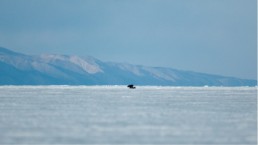‘Aquarela’ is a Near-Wordless Ode to the Natural World
Glaciers are melting, what does that mean for the future?
AQUARELA (2019)
Directed by Viktor Kossakovsky
Distributed by Sony Pictures Classics. 89 minutes. Opening 8/16 at ArcLight Hollywood and AMC Century City 15.
Perhaps the best summarization that could exist for Aquarela, Russian director Viktor Kossakovsky’s ode to the raw power of the natural world, would be “the main character is water.” If you’re looking for a documentary with sit-down interviews, talking points, statistics, narration, or some sort of direct action plan and you see Aquarela, you will be disappointed, but that’s a bit like showing up to a tearjerker and complaining there aren’t enough jokes. So for intrigued viewers, it’s best to have some preparation for the upcoming experience.
Readers may note my love experimental documentaries that push the boundaries of cinema – they appear frequently in my writing because they deserve any additional publicity for their efforts. By premise alone, Aquarela appealed to me in the same way that Jennifer Peedom’s Mountain was an immensely satisfying ode to nature. Yet after seeing Aquarela, by comparison, even Peedom’s film, rooted by Willem Dafoe’s narration and an incomparable soundtrack, feels conventional. Aquarela doesn’t hold your hand in any way – it asks you to see nature, specifically water, in all its forms and develop your own narration as the film unfolds.
Starting with ice, the film begins in Siberia on the frozen waters of Lake Baikal. There’s a looming sense that the ice is melting faster than it should be. To its credit, the film never panders to climate change action – anyone seeing this film can decipher that climate change is an active part of any nature doc; it’s suggested in subtle, powerful ways. Extended shots of men walking around on the frozen lake, doing some sort of work, pay off into a tremendous, unbelievable sequence involving the recovery of items under the frozen surface. Without saying what the result is, it’s priceless. As a 15 minute short film, it would win the documentary Oscar (or go viral, depending on its end goal).
This is the most approachable section of the film – from there, we enter into the more alternative, experimental approaches to storytelling. We watch the numerous stages of water, fully realized in stunning, high-frame-rate footage that captures its raw power, whether as ice, waves, steam or somewhere in between the stages of liquid. It will work for some – it’s no doubt deliberate and deftly executed. Others will be alienated by its near-wordless approach. So long as you know what you’re getting into, the experience is yours to determine.
H. Nelson Tracey
Nelson is a film director and editor from Denver based in Los Angeles. In addition to writing for Cinemacy, he has worked on multiple high profile documentaries and curates the YouTube channel "Hint of Film." You can check out more of his work at his website, hnelsontracey.com

